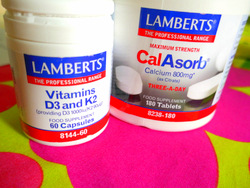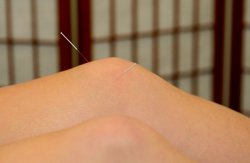 Bone density in postmenopausal women can be improved with a 12-month daily oral administration of 5g of specific collagen peptides, say researchers in Germany. A total of 131 women aged 46 to 80, were randomised to receive either a daily dose of collagen peptide or a placebo powder. The substances were dissolved in a glass of water and taken before breakfast. All subjects were given information on the importance of regular physical activity and balanced nutrition. They were also encouraged to take a daily dose of calcium (500-800mg) and vitamin D (400-800iu). A DEXA scan of the lumbar spine at L1-L4, and at the neck of the thigh bone, was performed at baseline and after 12 months. Blood levels of bone markers were also monitored.
Bone density in postmenopausal women can be improved with a 12-month daily oral administration of 5g of specific collagen peptides, say researchers in Germany. A total of 131 women aged 46 to 80, were randomised to receive either a daily dose of collagen peptide or a placebo powder. The substances were dissolved in a glass of water and taken before breakfast. All subjects were given information on the importance of regular physical activity and balanced nutrition. They were also encouraged to take a daily dose of calcium (500-800mg) and vitamin D (400-800iu). A DEXA scan of the lumbar spine at L1-L4, and at the neck of the thigh bone, was performed at baseline and after 12 months. Blood levels of bone markers were also monitored.
In the 102 women who completed the study, there were significant improvements in bone mineral density in the peptide group: 3% in the spine and 7% in the femoral neck. In the placebo group, bone density actually fell by around 1%. Similarly, blood levels of bone markers suggested increased bone formation in the treatment group, and increased bone degradation in the placebo group.
The authors say there is insufficient knowledge about which type of collagen peptides (marine, porcine, bovine etc) exerts the most favorable effect. The manufacturing process could also influence the properties of collagen peptides and thus their effectiveness. More human studies and additional data on optimal timing and dosage are needed.
(Specific Collagen Peptides Improve Bone Mineral Density and Bone Markers in Postmenopausal Women—A Randomized Controlled Study. Nutrients Journal, online 16 January 2018.)
 Researchers at the Department of Public Health in the University of Copenhagen, have shown that the beneficial effects of acupuncture for menopausal symptoms, can endure for at least 21 weeks following treatment. In a randomised controlled trial, women with moderate to severe symptoms were offered either weekly acupuncture sessions over five consecutive weeks, or the same treatment but delayed for six weeks. Statistically significant, sustained beneficial effects of acupuncture were found for hot flushes, sweating, and sleep issues, lasting up to 21 weeks after treatment.
Researchers at the Department of Public Health in the University of Copenhagen, have shown that the beneficial effects of acupuncture for menopausal symptoms, can endure for at least 21 weeks following treatment. In a randomised controlled trial, women with moderate to severe symptoms were offered either weekly acupuncture sessions over five consecutive weeks, or the same treatment but delayed for six weeks. Statistically significant, sustained beneficial effects of acupuncture were found for hot flushes, sweating, and sleep issues, lasting up to 21 weeks after treatment.
 Acupuncture helps hot flushes and other menopausal symptoms, according to researchers at the University of São Paulo in Brazil. In a crossover trial, 100 women were randomly allocated to receive either true or sham acupuncture. Treatment was given for 24 weeks, after which the two groups were swapped over, and each received the alternative treatment for another 24 weeks.
Acupuncture helps hot flushes and other menopausal symptoms, according to researchers at the University of São Paulo in Brazil. In a crossover trial, 100 women were randomly allocated to receive either true or sham acupuncture. Treatment was given for 24 weeks, after which the two groups were swapped over, and each received the alternative treatment for another 24 weeks. Acupuncture for hot flushes is as effective as hormone replacement therapy (HRT), according to Italian researchers. A total of 75 postmenopausal women with hot flushes were randomised to receive a three month course of either HRT, weekly acupuncture, or phytoestrogens. Scores of overall menopausal symptoms declined significantly in all three groups. Acupuncture and HRT were more effective than phytoestrogens for hot flushes specifically. At follow-up three months after the treatments had ended, symptom reduction remained greater in the acupuncture group compared with the HRT group.
Acupuncture for hot flushes is as effective as hormone replacement therapy (HRT), according to Italian researchers. A total of 75 postmenopausal women with hot flushes were randomised to receive a three month course of either HRT, weekly acupuncture, or phytoestrogens. Scores of overall menopausal symptoms declined significantly in all three groups. Acupuncture and HRT were more effective than phytoestrogens for hot flushes specifically. At follow-up three months after the treatments had ended, symptom reduction remained greater in the acupuncture group compared with the HRT group.  Danish researchers studying acupuncture for hot flushes and night-sweats, have shown even a brief, standardised course of treatment can offer fast and clinically relevant symptom reductions. Seventy women aged 40 to 65 with moderate to severe menopausal symptoms, and recruited from nine primary care practices, were randomised to either an acupuncture group or a waiting list control group. Acupuncture was given once a week for five weeks.
Danish researchers studying acupuncture for hot flushes and night-sweats, have shown even a brief, standardised course of treatment can offer fast and clinically relevant symptom reductions. Seventy women aged 40 to 65 with moderate to severe menopausal symptoms, and recruited from nine primary care practices, were randomised to either an acupuncture group or a waiting list control group. Acupuncture was given once a week for five weeks. Bone density in postmenopausal women can be improved with a 12-month daily oral administration of 5g of specific collagen peptides, say researchers in Germany. A total of 131 women aged 46 to 80, were randomised to receive either a daily dose of collagen peptide or a placebo powder. The substances were dissolved in a glass of water and taken before breakfast. All subjects were given information on the importance of regular physical activity and balanced nutrition. They were also encouraged to take a daily dose of calcium (500-800mg) and vitamin D (400-800iu). A DEXA scan of the lumbar spine at L1-L4, and at the neck of the thigh bone, was performed at baseline and after 12 months. Blood levels of bone markers were also monitored.
Bone density in postmenopausal women can be improved with a 12-month daily oral administration of 5g of specific collagen peptides, say researchers in Germany. A total of 131 women aged 46 to 80, were randomised to receive either a daily dose of collagen peptide or a placebo powder. The substances were dissolved in a glass of water and taken before breakfast. All subjects were given information on the importance of regular physical activity and balanced nutrition. They were also encouraged to take a daily dose of calcium (500-800mg) and vitamin D (400-800iu). A DEXA scan of the lumbar spine at L1-L4, and at the neck of the thigh bone, was performed at baseline and after 12 months. Blood levels of bone markers were also monitored.